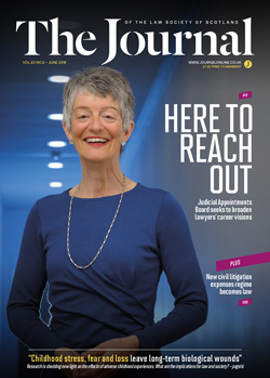Complaints: from "bonkers" to benefit?

Outgoing President Graham Matthews noted at the Society’s AGM that the Scottish Legal Complaints Commission was looking to move away from its present operating system, which the fraught annual budgeting process has to support.
Speaking at an event focusing on improving the consumer experience, Jim Martin said there was no point tinkering with the system, which should be replaced with one that was “modern, agile and fair”.
The occasion was one of two organised last month through the SLCC, this one with the Consumer Dispute Resolution Centre (CDRU) at Queen Margaret University. A few days later, the SLCC’s consumer panel held a round table on recognising and adapting to the needs of vulnerable consumers.
With previous roles as Scottish Public Services Ombudsman and Police Complaints Commissioner for Scotland, Martin’s view was that he “had never seen anything more complex, rigid and legalistic” than the scheme in the Legal Profession and Legal Aid (Scotland) Act 2007. It failed to focus on any of the internationally recognised consumer principles, or to meet the Scottish Government’s “better regulation principles” (proportionate, transparent, accountable, consistent, targeted and agile), and did not do the professions any good, while presenting a “huge complex maze” to complainers. Amendments during the passage of the bill had only added to its complexity and rigidity.
Call to collaborate
Among his criticisms was that a complaint had to go through the same process whether it was worth £200 or £2 million; the imposition of court standards on the process, “which restricts our ability to take commonsense decisions”; the SLCC’s inability to pilot different models; and the £20,000 cap on compensation, irrespective of value (“not the real world”).
He told an audience comprising complaints experts, consumer bodies and sector representatives, among them the Society’s office bearers, that he was also astonished how much burden was placed on the individual practitioner as compared with firms or organisations – and expressed surprise that the consumer voice had not been heard more strongly since the Act was introduced.
A member of the panel assisting Esther Roberton in her review of the regulation of legal services, Martin said he was willing to work with anyone who would collaborate with the SLCC in making improvements happen.
He concluded: “While we welcome the current collaborative work with the Law Society to identify what can be changed by regulation, we need to move away from tinkering with a system which is simply not fit for purpose. Lessons need to be learned from the mistakes made in the past. To achieve a complaints process which is fit for the 21st century we must be prepared to embrace far more radical change.”
Participation model
Opening the evening, Jane Williams of the CDRU presented on consumer experiences of ADR services. As with most processes, she said, managing expectations was important, as was communication: some expected a service to go in and sort out their problem for them; and there was also a risk of slipping into the language of the provider being complained against, giving the impression of taking their side. (Solicitors might have drawn lessons about not using too formal or even “intimidating” language towards complainers.)
In summary, Williams suggested that more participative ADR models better met the consumer’s desire to be part of the process.
She was followed by Fife NHS services manager Louise Ewing, whose personal experience with her father’s treatment and the barriers to complaining about it had led her into complaints work. Small, subtle changes from the complainer’s perspective could make a huge difference, she believed – and taking time with them at the outset could make a huge difference. While the NHS is now subject to a statutory duty of candour, her message was “Get that right and the rest falls into place.”
Many vulnerabilities
The consumer panel session was interesting first of all for its exploration of vulnerability “risk factors”. Whereas the solicitors’ practice rules on “vulnerable clients” refer to a specific type of disadvantage, here we ranged over physical, age, education, economic, linguistic and cultural factors – and situational, as in relationship breakdown or job loss – which can affect almost any individual. All the many ways, in effect, reflecting how the solicitor-client “power balance” referred to by Roberton in her interview at Journal, March 2018, 12, is weighted in favour of the adviser.
If the present system under which the SLCC has to operate – which will require legislation to change – is agreed to be not a good one either for complainers or solicitors, what should a replacement look like? The session was not left with much time to discuss this, but five key concepts were put forward: it should be user centred; “co-creative” (i.e. designed by those who know how the services are accessed, including the SLCC), holistic, evidencing (allowing information on where a complaint is and what is happening to it), and sequencing (avoiding having to repeat the same conversations).
A question posed at the end by SLCC chief executive Neil Stevenson was, do we increase trust and adopt something “principles based” that permits easier process change? That certainly appears to be the direction of travel.
In this issue
- Recovery of electronic documents: time for guidance?
- Reasonable treatment options and professional judgment
- Retention demystified?
- Child law: time for change? (1)
- Reading for pleasure
- Opinion: Ayla Iridag
- Book reviews
- Profile: Rachael Delaney
- President's column
- Keeper's update
- People on the move
- Choice answers
- When four ACEs is a bad hand
- Litigation: passing the bill
- Child law: time for change?
- Debt recovery and AI: are we plugged in?
- Technical but important
- Ringing the changes: UK and EU IP developments
- Commercially sensitive? Justify that
- Abandonment: whose use counts?
- Retroactive TUEs and the Nasri case
- Clarifying real burden enforcement rights
- How we deal with leases at termination
- In-house and in the know
- Public policy highlights
- Meet Laura
- Complaints: from "bonkers" to benefit?
- That time of year again
- AGM does ABS – a reprise
- Paralegal pointers
- Finance for dummies (and lawyers)
- Ask Ash






